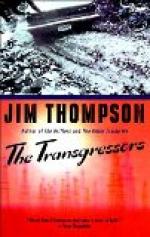Do the shouts come from the militia?
With ever-increasing magnitude the cheering continues. Whatever the object may be, it is approaching the palace.
A reflex movement in the crowds indicates that danger is upon them.
“It’s the Pinkertons!” is the terror-stricken cry that arises.
CHAPTER XXIX.
PEACE HATH HER VICTORIES.
Now the shouting swells into a general outburst of enthusiasm. “Trueman! Trueman!” are the words that reach the ears of the men at the foot of the terrace.
It is not the militia then, that is swooping down upon the people to crush them for demanding the body of their dead; it is not the Pinkertons. It is the champion of the people come to their aid!
Breathless from the three miles he has traversed at a run, Trueman sinks exhausted on the stone steps in front of Purdy’s house.
The excited leaders cluster about him and tell him of the events that have transpired during the afternoon and early evening. “It was four o’clock when we first heard that Metz had shot and killed Purdy. The news spread to all the mills and furnaces,” explains Chester, one of the yard hands of the local depot.
“Some one started the story that the police had been instructed to bury Metz secretly for fear there would be trouble if he was given a public funeral. You know there was a note found on him which said he had killed Purdy for the good of the workingmen.”
“Yes,” breaks in O’Neil, “the folks all over town said they were bound to see Metz given decent burial. A committee came to me and asked if I would head a procession to come here and demand the body. We came and were refused it. Then we broke into the house and got Metz’s body.
“Some one started the cry, ’Find Purdy’s body and bury it in Potter’s field!’ This set the crowd crazy. I could not prevent their seizing it.”
Harvey Trueman listens to the stories of the men. He realizes that no half-measure can be proposed. It will either be necessary for him to acquiesce to their plan to throw the multi-millionaire’s body into the Potter’s field or else oppose them to the last point.
With the knowledge of the various events that have occurred he can estimate the effect that such an act of violence will have upon the country. Should the people of the other mining districts hear that the miners of Wilkes-Barre have risen in revolt against their masters it may precipitate a general uprising.
The deaths of the leading financiers and manufacturers throughout the country have made a panic inevitable. If to this is added rioting, the country will be plunged into a state of veritable anarchy. Why should not Wilkes-Barre be the centre of this national movement for a peaceable solution of the question of the rights of labor? One clear note of confidence sounded amid the general babel may serve as the signal for rational action.




